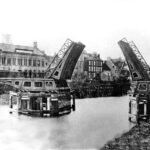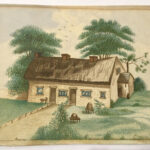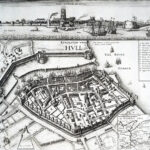23 January 1640: Andrew Marvell’s father drowns in the Humber at Hull
Thomas Fuller. 1811. The History of the Worthies of England, Vol. 1. London: F.C. and J. Rivington. Get it:
.Unedited excerpt
If an excerpt is used in the book, it will be shorter, edited and, where applicable, translated.
ANDREW MARVAIL [Senior] was born at Mildred in this County, and bred a Master of Arts in Trinity College in Cambridge. He afterwards became minister in Hull, where for his life-time he was well beloved: most facetious in his discourse, yet grave in his carriage, a most excellent preacher, who, like a good husband, never broached what he had new brewed, but preached what he had pre-studied some competent time before; insomuch that he was wont to say, that he would cross the common proverb, which called “Saturday the working day, and Monday the holy-day of preachers.” It happened that, anno Domini 1640, Jan. 23, crossing Humber in a barrow-boat, the same was sand-warped [swept by the tide on to a sandbank – a localism?], and he drowned therein, by the carelessness (not to say drunkenness) of the boat-men, to the great grief of all good men.
Comment
Comment
Andrew Junior left to look after himself.
The manner of his father’s death, and the fact that the poet himself was born in reclaimed Holderness, should give pause to those who take offence at his lines on Holland:
How did they rivet with gigantic piles,
Thorough the centre their new-catched miles,
And to the stake a struggling country bound,
Where barking waves still bait the forced ground,
Building their watery Babel far more high,
To reach the sea, than those to scale the sky!
Yet still his claim the injured ocean laid,
And oft at leap-frog o’er their steeples played,
As if on purpose it on land had come
To show them what’s their mare liberum.
A daily deluge over them does boil;
The earth and water play at level coil.
The fish ofttimes the burgher dispossessed,
And sat, not as a meat, but as a guest (Marvell 1665).
I must find out more about Mrs. Skinner of Thornton, North Lincolnshire, who adopted him.
Marvell was not the only person with reason to dislike the crossing:
There are some good towns on the sea-coast; but I include not Barton, which stands on the Humber, as one of them, being a straggling mean town, noted for nothing but an ill-favoured dangerous passage, or ferry, over the Humber to Hull; where, in an open boat, in which we had about 15 horses, and 10 or 12 cows, mingled with about 17 or 18 passengers, we were about 4 hours tossed about on the Humber, before we could get into the harbour at Hull. Well may the Humber take its name from the noise it makes; for in an high wind it is incredibly great and terrible, like the crash and dashing together of ships (Defoe 1748).
In “To a Coy Mistress” Marvell laments his lover’s absence in the lines “I by the tide/ Of Humber would complain” (Marvell 1898), which inspired Angela Leighton to a rather excellent poem, “By the Tide of Humber” (Leighton 2023) which I hope I’ll be allowed to use.
I haven’t managed to access Nicholas von Maltzahn’s “Death by Drowning: Marvell’s ‘Lycidas’.”
Something to say? Get in touch
Similar
 1 July 1840: The opening of the Hull and Selby Railway terminates the threat to Hull’s port from Goole, Scarborough and Bridlington
1 July 1840: The opening of the Hull and Selby Railway terminates the threat to Hull’s port from Goole, Scarborough and Bridlington 14 April 1843: John Nicholson, “the Airedale Poet,” “the Bingley Baron,” dies after falling into the Aire while drunk
14 April 1843: John Nicholson, “the Airedale Poet,” “the Bingley Baron,” dies after falling into the Aire while drunk 18 January 1966: Barbara Castle (Lab.) swings the Hull North by-election with a bridge over the Humber, convincing Harold Wilson that he has the momentum to win a general election
18 January 1966: Barbara Castle (Lab.) swings the Hull North by-election with a bridge over the Humber, convincing Harold Wilson that he has the momentum to win a general election
Comment
Comment
Smeaton’s scheme did not prosper. John Timperley:
Various schemes had been suggested for cleansing the dock of the mud brought in by the tide; one was by making reservoirs in the fortifications or old town ditches, with the requisite sluices, by means of which the mud was to be scoured out at low water; another by cutting a canal to the Humber, from the west end of the dock, where sluices had been provided, and put down for the purpose, when it was proposed to divert the ebb tide from the river Hull along the dock, and through the sluices and canal into the Humber, and so produce a current sufficient, with a little manual assistance, to carry away the mud. Both of these schemes were however abandoned, and the plan of a horse dredging machine adopted; this work began about four years after the Old dock was completed, and continued until after the opening of the Junction dock. The machine was contained in a square and flat bottomed vessel 61 feet 6 inches long, 22 feet 6 inches wide, and drawing 4 feet water: it at first had only eleven buckets, calculated to work in 14 feet water, in which state it remained till 1814, when two buckets were added so as to work in 17 feet water, and in 1827 a further addition of four buckets was made, giving seventeen altogether, which enabled it to work in the highest spring tides. The machine was attended by three men, and worked by two horses, which did it at first with ease, but since the addition of the last four buckets, the work has been exceedingly hard.
There were generally six mud boats employed in this dock before the Humber dock was made; since which there have been only four, containing, when fully laden, about 180 tons, and usually filled in about six or seven hours; they are then taken down the old harbour and discharged in the Humber at about a hundred fathoms beyond low water mark, after which they are brought back into the dock, sometimes in three or four hours, but generally more. The mud engine has been usually employed seven or eight months in the year, commencing work in April or May.
The quantity of mud raised prior to the opening of the Junction dock, varied from 12,000 to 29,000 tons, and averaged 19,000 tons per annum; except for a few years before the rebuilding of the Old lock, when, from the bad and leaky state of the gates, a greater supply of water was required for the dock, and the average yearly quantity was about 25,000 tons. As the Junction dock, and in part also the Humber dock, are now supplied from this source, a greater quantity of water flows through the Old dock, and the mud removed has of late been about 23,000 tons a year.
It may be observed, that the greatest quantity of mud is brought into the dock during spring tides, and particularly in dry seasons, when there is not much fresh water in the Hull; in neap tides, and during freshes in the river, very little mud comes in (Timperley 1842).
Something to say? Get in touch
Search
Donate
Music & books
Place-People-Play: Childcare (and the Kazookestra) on the Headingley/Weetwood borders next to Meanwood Park.
Music from and about Yorkshire by Leeds's Singing Organ-Grinder.



 Bluesky
Bluesky Extwitter
Extwitter